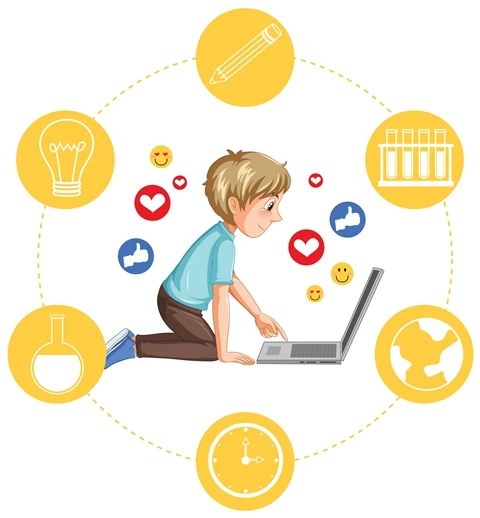
Digital Addictions
- Digital Addictions
- History of Internet Addiction
- Characteristics of Internet Addiction
- Internet Addiction
- Common Definitions within Internet Addiction
- Treatment Methods for Internet Addiction
With the rapid advancement of technology in today's world and the significant changes in the way people communicate and engage in recreational activities over the past 3 years, access to information has undergone significant transformations. Desktop computers were replaced by laptops, and then smartphones became an integral part of our lives. Features such as online education through tablets during the pandemic, unlimited internet and social media usage provided by mobile operators have made the use of technology essential. Consequently, excessive and harmful use of technology has led to the emergence of a new diagnostic category in the literature of mental health professionals: "digital addictions"...
"Internet addiction," "internet gaming disorder," and "internet gambling disorder" are just a few of the conditions encompassed by this broad definition.
History of Internet Addiction
We know that the first case of internet addiction was defined in 1995. It involved an individual who spent 40-60 hours online in chat rooms, resulting in financial difficulties and divorce. This person was diagnosed by Dr. Kimberly Young as the first case of internet addiction.
Characteristics of Internet Addiction
- The individual cannot control their desire to use the internet.
- The importance of non-internet activities diminishes.
- Irritability, aggression, and restlessness can be observed when the individual is deprived of internet access, negatively affecting their interpersonal relationships, academic life, and/or professional life.
Internet Addiction
Who is at risk for internet addiction today?
- Those who frequently use social media and gaming websites.
- Those who use the internet extensively due to their profession.
- Males.
- Younger population.
- Unemployed individuals.
In individuals diagnosed with internet addiction, there is a greater lack of social communication skills and weaker coping mechanisms for dealing with stress and anxiety. Additionally, it has been observed that compulsive shopping behavior is most commonly associated with internet addiction, followed by pathological gambling disorder and compulsive sexual addiction.
Another underlying cause of harmful internet use is identity issues. The ability to use fake/hidden identities online, create virtual personas, and express ideas more freely in the virtual environment allows individuals to obtain the desired identity. In this way, they can satisfy their desire for novelty and freedom, escape social and familial pressures, and feel a sense of control.

Common Definitions within Internet Addiction
NoMoPhobia, Wireless Phobia, and FOMOphobia are frequently encountered terms within internet addiction.
- NoMoPhobia (No Mobile Phobia): Fear of being without a mobile phone, characterized by excessive time spent with smartphones, having multiple smart devices, and constantly carrying chargers. The individual experiences great anxiety when mobile devices are lost, unreachable due to lack of coverage, or run out of battery. The mobile device is frequently checked for messages or calls and is rarely turned off throughout the day. As a result, face-to-face communication is severely limited, and excessive use of smart devices leads to increased spending.
- Netlessphobia: In netlessphobia, individuals cannot tolerate being in an environment without internet access and feel anxious about its absence. They make sure there is internet connection wherever they go, and the thought of life coming to a halt without internet, missing out on developments that can never be caught up again, causes distress.
- FOMOphobia (Fear of Missing Out): Also known as the fear of missing out on developments. Individuals with FOMOphobia constantly worry about missing something or being left out. They feel lonely and try to compensate for their feelings of deficiency by relying on social media posts and feedback.
Treatment Methods for Internet Addiction
Although there is no specific medication for treating internet addiction, patients can benefit from psychotherapies that primarily utilize behavioral methods.
- Shifting internet usage hours to the opposite of the current pattern.
- Setting written goals related to internet usage.
- Preparing reminder cards.
- Keeping a journal for recording intended actions.
- Changing the location of the computer within the home.
- Taking internet breaks.
- Learning relaxation exercises.
- Seeking support to improve social communication skills.
- If there is accompanying depression, anxiety disorder, and harmful substance use, getting treatment for them is an example of what can be done to cope.




